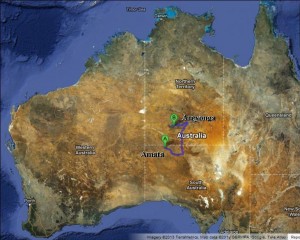Distance has not prevented the eagerness of the Pitjantjatjara people living in Areyonga to be involved in translating the Old Testament into Pitjantjatjara.
 Areyonga is several hundred kilometres from the Pitjantjatjara traditional land in the North West of South Australia and the South West of the Northern Territory. It is located not far from the Western Arrernta community of Hermannsburg in the MacDonald Ranges West of Alice Springs.
Areyonga is several hundred kilometres from the Pitjantjatjara traditional land in the North West of South Australia and the South West of the Northern Territory. It is located not far from the Western Arrernta community of Hermannsburg in the MacDonald Ranges West of Alice Springs.
Yet despite the distance, the Pitjantajara people in Areyonga quickly heard about the Bible translation project, which was first discussed at Amata over the border in South Australia at a meeting in April 2010.
Paul Eckert who works with Bible Society Australia’s Remote and Indigenous Ministries team, relates, “Following that meeting phone calls were made to relatives in Areyonga telling them about it in anticipation of their getting involved too.”
Paul, who with his wife Ann raised a family in APY lands, coordinated the team that completed the translation of the New Testament into Pitjantjatjara. He is now co-ordinating the new generation of Christians who have risen up with the desire to translate the Old Testament into their heart language.
In mid-February Paul travelled to Areyonga in response to the interest shown by the Pitjantjatjara people there in being a part of the Pitjantjatjara Old Testament Project.
As well as the interest shown by the people, Lutheran Pastor Rob Borgas of the Finke River Mission, who provides ministry support to the Pitjantjatjara pastors and their congregations in the Northern Territory, also indicated his wholehearted support for such a project.
The February workshop was set up in October last year, with Paul, Pastor Rob Borgas and a group of mainly ladies from the Areyonga congregation meeting and confirming their interest in having an introductory workshop on Bible translation at Areyonga.
“The first day over a dozen people came along to find out whether it was something that they wanted to be involved in,” says Paul. “Over the course of the week, as people got a good idea of what was involved, some decided it wasn’t for them and others got into it with gusto.”
Each day two sessions were held, in which Paul began to introduce those attending to some of the main principles used in translation and the differences between the grammar of English and Pitjantjatjara. “The more they become familiar with these things the better the translation will be,” Paul explains. He was assisted in running the workshop by Bible teacher Phil Townsend and Pastor Rob Borgas.
The workshop worked on the text of 2 Samuel, since the people had expressed an interest in the history books, and 1 Samuel was already being done by Kanytjupai. By the end of the week the participants had translated the first 16 verses of 2 Samuel, as well as doing a check on drafts of Psalms 3 and 95 which had been translated by people over the border.
During the week participants were given a very brief introduction to Hebrew; an outline of how the Bible has been translated in to different languages over the centuries; an overview of the Old Testament, where all the different books fit in and the type of literature that each book is – history, law, poetry, song, wisdom, etc; an understanding of the translation process from beginning to end including the different roles that people can play; and evening times of worship and watching a film of the life of David.
Participants were also encouraged to count the cost of being involved in a project such as this. Paul says, “Though they will not have to face being burnt at the stake, like early English translator Tyndale, they will face challenges and will need to be reliant on God’s grace and the prayers and support of other Christians.” These new translators will continue to be supported by Paul Eckert and Rob Borgas as they develop their skills.
As well as those who attended the workshop, there were several people in Areyonga that were not able to attend due to their work commitments. However, other arrangements have been made with them so they may participate in the Bible translation project.
Email This Story
Why not send this to a friend?
